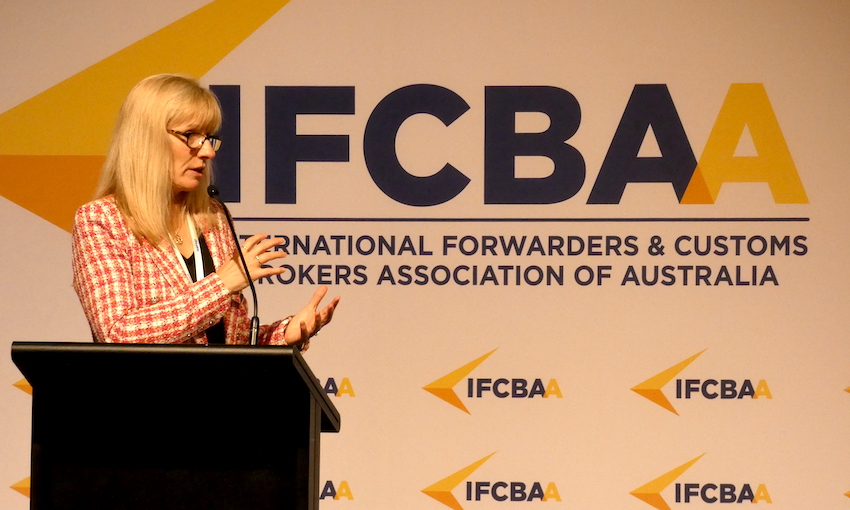FREIGHT and logistics professionals from across Australia met at the International Forwarders and Customs Brokers Association of Australia conference on Friday to explore pathways forward from a challenging year.
The 2022 IFCBAA National Conference was held over two days at the JW Marriot resort in Surfers Paradise on the Gold Coast.
Day one kicked off with an official welcome and update from IFCBAA chair Adam Butler and IFCBAA CEO Paul Damkjaer respectively.
Australian Border Force commissioner Michael Outram then gave a presentation on supply chain integrity and the importance of global trading systems, which laid the groundwork for the discussions that followed.
Matthew Schroder of the Australian Competition and Consumer Commission unpacked the findings of the ACCC Container stevedoring monitoring report 2020-21, including issues around port privatisation and around Part X of the Competition and Consumer Act 2010.
“Part X allows shipping lines to have a complete exemption from the … competitive measures in the act,” he said, describing it as “highly unusual” and no longer fit for purpose.
Mr Schroder also discussed vertical integration between shipping lines and landside logistics services, which he said isn’t seen as an issue for the ACCC.
“That said, we don’t want to see the development of a dominant player, and we don’t want to see a situation that would lead to substantially less competition,” he said.
“We do review those mergers that result in vertical integration, but what we have to do to prevent a merger is to prove there is a substantial lessening of competition from that transaction.”
TradeWindow chief revenue officer Andrew Balgarnie explored the role of information technology and digital trade processes in freight forwarding and customs clearance.
He noted pandemic challenges and the supply chain crisis are not the only factors driving digitalisation in the industry. Government policy, the urgency of data security and sustainability also contribute to its acceleration.
After lunch, trade lawyer Andrew Hudson shared a legal update which explored new FTA developments, sanctions and import and export controls, decisions on dumping duty and licencing issues for LCBs.
He also discussed the 2022-23 Federal Budget, under which a significant amount of money was committed to assisting cross-border trade.
“What’s significant is it’s been given to a variety of different agencies; some has been given to the Simplified Trade System Implementation Taskforce, some to the border force, some to the department of agriculture, and some to the department of industry,” he said.
“It’s all very well to talk about that, but if you don’t have them co-ordinated, there’s no oversight over the whole project. They’re all doing work in different silos. But the whole idea is not to have silos, but to have a seamless one-touch transition.”
Later, in a dedicated air cargo forum, International Air Transport Association area manager SW Pacific Matteo Zanarini outlined IATA’s air cargo priorities for 2022.
They include sustainability, end-to-end digitalisation, safe carriage of cargo and mail, and work to facilitate the global distribution of healthcare products and securing and facilitating cross-border movements.
And, Qantas Freight head of network & air operations Riki Cannon introduced the company’s new integrated freight management platform, Dock Direct.
Finally, IFCBAA’s Teresa Giannini and Sterling Richards of My Freight career addressed the urgency of attracting new talent to the industry, which was a recurring theme throughout the day.
Mr Richards said employee engagement can be improved through improved job design, work conditions and corporate culture; timely and meaningful feedback; and increased support and resources.

